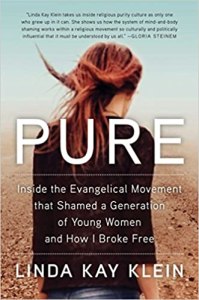Title: Pure: Inside the Evangelical Movement That Shamed a Generation of Young Women and How I Broke Free
Author: Linda Kay Klein
Genre: Memoir/Sociology/Religion
Trigger Warnings: Sexual content, sexual assault, rape, pedophilia, child sexual abuse, incest, religious trauma, religious bigotry, homophobia, body shaming, medical content
Back Cover:
From a woman who has been there and back, the first inside look at the devastating effects evangelical Christianity’s purity culture has had on a generation of young women—in a potent combination of journalism, cultural commentary, and memoir.
In the 1990s, a “purity industry” emerged out of the white evangelical Christian culture. Purity rings, purity pledges, and purity balls came with a dangerous message: girls are potential sexual “stumbling blocks” for boys and men, and any expression of a girl’s sexuality could reflect the corruption of her character. This message traumatized many girls—resulting in anxiety, fear, and experiences that mimicked the symptoms of Post-Traumatic Stress Disorder—and trapped them in a cycle of shame.
This is the sex education Linda Kay Klein grew up with.
Fearing being marked a Jezebel, Klein broke up with her high school boyfriend because she thought God told her to, and took pregnancy tests though she was a virgin, terrified that any sexual activity would be punished with an out-of-wedlock pregnancy. When the youth pastor of her church was convicted of sexual enticement of a twelve-year-old girl, Klein began to question the purity-based sexual ethic. She contacted young women she knew, asking if they were coping with the same shame-induced issues she was. These intimate conversations developed into a twelve-year quest that took her across the country and into the lives of women raised in similar religious communities—a journey that facilitated her own healing and led her to churches that are seeking a new way to reconcile sexuality and spirituality.
Review:
I went into this book going, “I had no guilt or shame having premarital sex after I left Christianity, so it will be interesting to read about other people’s experiences but I’m not going to get swamped with feelings like I did with other similar books.” And if you want to take a moment to chuckle at the naïveté, go ahead, because somehow I had entirely forgotten that purity culture was about so much more than “premarital sex is bad.”
This book is a combination of sociology and memoir. Linda starts each section with an extended story from her own life, but continues with interviews she did with other people who grew up in purity culture (some of whom are still Christian, some of whom aren’t) and ties it all together with a narrative of the problems purity culture causes. If you’re familiar with autoethnography, it feels like one that’s just written for a general readership instead of an academic one.
For being as short as it is (the audiobook is only 9 hours), it packs a lot into its pages, and yet still feels like there is tons more to say on the topic. Which there probably is – purity culture is a broad topic that’s hurt a lot of people and there’s no way anyone could cover all the nuances in one book, even if that book was twice as long as Pure. Though an insider like me can point out all the nuances Linda missed, she did a really good job portraying the major factors and making the ideas accessible to people outside purity culture.
There are a lot of intense feelings and traumas in these pages, but also a lot of revelations for me as someone who grew up in purity culture. Linda’s example of her struggle with Crohn’s disease was especially revelatory in how her physical suffering redeemed her evil body (which had developed undeniable hips and breasts and therefore was unquestionably Sexual and therefore Evil) and made her good in the eyes of her church.
This book is a lot. It’s intense and full of trauma, body shaming, and little girls being sexualized so they can be shamed for that sexualization. But it is very well-written and the stories contained well-told, and it strikes a good balance between being relatable and helpful to the purity culture survivor and accessible to the purity culture outsider. This is a very worthwhile book.

